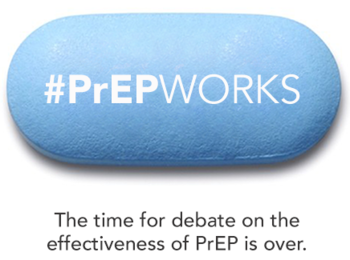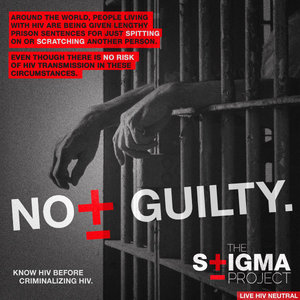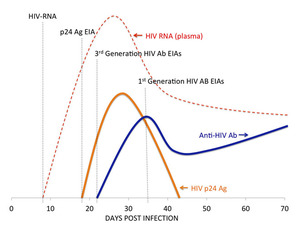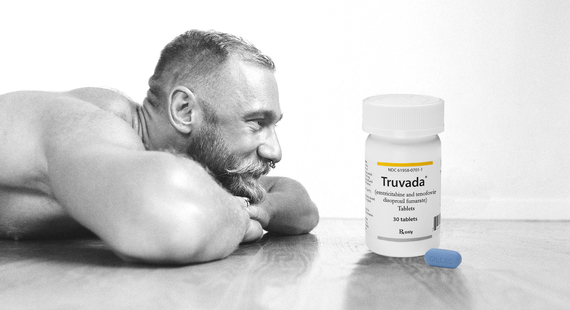Workplace Protection for LGBT Employees- Caitlin O'Neil
Law 2050-Section 117.
Daily Archives: December 2, 2014
WATCH: 'Is Peter Pan Straight or a Lesbian?'
WATCH: 'Is Peter Pan Straight or a Lesbian?'
Jane Krakowski is cool with whatever.
Brandon Voss
www.advocate.com/comedy/2014/12/02/watch-peter-pan-straight-or-lesbian
26th World AIDS Day: Get in There, Do Something, Change Things
26th World AIDS Day: Get in There, Do Something, Change Things
Pre-exposure prophylaxis (PrEP) and treatment as prevention (TasP) have successfully returned sexual health to the national and international headlines. Not since the early years of the HIV epidemic has there been so much constructive dialogue, progress, and involvement by the public.
Long-term survivors, HIV organizations, scientists, public-health experts, and the generation that never knew a world without HIV joined hands on the 26th World AIDS Day in an effort to educate and advocate in commemoration of those we have lost to HIV and the people living with the infection today.
 While a few still wage a lonely and wasteful fight against science and progress itself, it is time to acknowledge that we finally have the opportunity to move on from a monotonous, one-way conversation and use these new tools as catalysts for serious and much-needed change.
While a few still wage a lonely and wasteful fight against science and progress itself, it is time to acknowledge that we finally have the opportunity to move on from a monotonous, one-way conversation and use these new tools as catalysts for serious and much-needed change.
Of course, it doesn’t help when one of our favorite Star Trek actors throws all logic overboard and simply dismisses today’s generation as lazy, complacent and irresponsible, but it certainly shows that we haven’t progressed much since President Reagan’s infamous call to abstinence 27 years ago.
Six of the estimated 39 million people we lost worldwide to HIV were my friends and mentors. All six would have agreed with Meryl Streep’s Margaret Thatcher when she says in The Iron Lady, [I]f something’s wrong, they shouldn’t just whine about it. They should get in there and do something about it. Change things.”
 In the 1980s we did just that, and today’s generation follows suit. We too get in there, do something, and change things. My next two weeks, for example, are tightly scheduled, with 10 PrEP panels across the U.S. Yesterday I was in Palm Springs and Los Angeles, today I am in New York City at Columbia University, on Dec. 4 I will be in Cleveland, on Dec. 6 I will be in Grand Rapids, on Dec. 7 I will be in Lansing, on Dec. 8 I will be in Detroit, on Dec. 10 I will be in St. Louis, on Dec. 11 I will be in Atlanta, and on Dec. 12 I will be in San Francisco.
In the 1980s we did just that, and today’s generation follows suit. We too get in there, do something, and change things. My next two weeks, for example, are tightly scheduled, with 10 PrEP panels across the U.S. Yesterday I was in Palm Springs and Los Angeles, today I am in New York City at Columbia University, on Dec. 4 I will be in Cleveland, on Dec. 6 I will be in Grand Rapids, on Dec. 7 I will be in Lansing, on Dec. 8 I will be in Detroit, on Dec. 10 I will be in St. Louis, on Dec. 11 I will be in Atlanta, and on Dec. 12 I will be in San Francisco.
Here are five key focus points that I believe we must act on:
Sexual-Health Education and Health Programs in Schools
Sexual-health education, especially in the U.S., is a mess. In a country where religious morals often dictate the code of conduct, preparing the next generation for when they first turn wet dreams into reality becomes challenging. This difficulty manifests itself in the U.S.’s shocking teenage-pregnancy rates, which surpass those of other Western countries by 20 points, and the rising rates of new HIV infections in young people. What we need is a federal minimum requirement for sexual-health curricula that includes a judgment-free approach to LGBTQ rights, issues, and history, as well as a public youth-health program to provide vaccinations, health screenings, and counseling to all adolescents free of charge.
Decriminalization of HIV
 Exposing someone to HIV with or without a condom is a crime in many places, often regardless of whether an actual transmission occurred. While this may seem well-intended on first glance, these laws heavily discriminate against people living with HIV and automatically make them culprits.
Exposing someone to HIV with or without a condom is a crime in many places, often regardless of whether an actual transmission occurred. While this may seem well-intended on first glance, these laws heavily discriminate against people living with HIV and automatically make them culprits.
Regardless of HIV status, the stigma around HIV has impacted us all culturally and emotionally. Decriminalizing HIV means alleviating that stigma, empowering, and educating.
Reclassification of HIV as a Chronic Infection
Thanks to the great strides we have made when it comes to the treatment of HIV, an infection with the virus no longer automatically equals an inevitable progression into the terminal illness known as AIDS.
Diabetes, for example, is classified as a chronic illness. Reclassifying HIV as a chronic infection instead of as a terminal illness would lead to easier access to medication, care, and services, which in turn would lead to higher rates of viral suppression and thus reduce the number of new HIV infections.
Updating of Testing Guidelines
Our prevention toolbox primarily consists of condoms, PrEP, post-exposure prophylaxis (PEP), TasP and testing. However, how well testing can reduce transmission risks depends on what test is being used and at what frequency.
After exposure, it takes about 10 days for the virus to replicate itself enough within the body to be infectious. This is known as the “eclipse period.” The following 90 days, the “acute infection period,” are the most infectious. Currently the CDC recommends annual testing and notes that there could be some benefit from more frequent testing.
 The best tests we have available today are HIV RNA tests that detect the virus seven to 10 days after exposure, and fourth-generation antibody or p24 antigen tests that detect the virus about 17 days after exposure. The time from exposure to detection is called the “window period.” In comparison with these newer tests, the first and second generations of HIV antibody tests generally have a window period of about five to 12 weeks.
The best tests we have available today are HIV RNA tests that detect the virus seven to 10 days after exposure, and fourth-generation antibody or p24 antigen tests that detect the virus about 17 days after exposure. The time from exposure to detection is called the “window period.” In comparison with these newer tests, the first and second generations of HIV antibody tests generally have a window period of about five to 12 weeks.
Testing can be costly, though, and as first- and second-generation HIV antibody tests are still FDA-approved in the U.S., they remain the most commonly used.
Updated testing guidelines should recommend that sexually active people get quarterly health screenings for all STIs, and that older tests be removed in order to shorten the possible transmission cycle of acute infections.
Access and Health Insurance
The Medicaid expansion under the Affordable Care Act was undeniably one of the most important steps to reduce the number of new infections, by enabling people in heavily affected populations to access care. Sadly, 10 states that report some of the highest HIV-infection rates are among the 19 states that are not expanding Medicaid.
Making health insurance accessible and understandable should be a key focus.
Employees should be health-insured from the first day on the job. The current 90-day insurance gap is a vital threat to drug adherence, continuous care, and continuous prevention.
HIV medications that are currently classified as “specialty drugs” should be considered maintenance drugs and be placed in lower copay tiers.
Truvada and drugs that may be approved in the future for use as PrEP should be considered preventative medications, because that’s really what they are in this case. This would greatly decrease access disparities and increase awareness, especially on the side of the PCPs.
Drug formularies need to be easier to understand. For many people in the U.S., this is a completely new concept, and they are overwhelmed by information that is unnecessarily complicated. California Senate Bill 1052 is focused around this issue and was just signed into law in September 2014.
NEWS: George Clooney, 'Hands Up, Don't Shoot', Chris Pratt, Uganda
NEWS: George Clooney, 'Hands Up, Don't Shoot', Chris Pratt, Uganda
Jared Leto, Will Smith and Tom Hardy to bring their handsomeness to DC Comics’ Suicide Squad.
George Clooney and Downton Abbey collide.
After 5 players on the St. Louis Rams entered the field on Sunday signalling a “hands up, don’t shoot” gesture that has become synonymous with protest and outrage over the failure to indict Darren Wilson for shooting and killing Michael Brown, a St. Louis sports bar took to their Facebook to make their displeasure over the gesture known: “Due to the bone headed ‘hands up, don’t shoot’ act by the number of Rams players on the Sunday game the Time Out Bar & Grill will no longer support the St Louis Rams, so we will no longer have Happy hours for the Rams games and all signs and pictures will be off the walls…We have to stand up to thugs who destroy our community and burn down local business, and boycott the other thugs/organizations who support them…”
Congressional Democrats also used the “hands up, don’t shoot” gesture as a sign of protest on the House floor. No word yet whether any Democratic haunts in DC have been outraged by this.
Ariana Grande and Taylor Swift worked the Victoria’s Secret Fashion Show in London last night.
Bradley Cooper opens up about being sober and bulking up for American Sniper: “I did it naturally because I’ve been sober for 10 years and didn’t want to do anything. I had a realistic conversation. Can I do this in three months naturally? Can I gain 30 pounds of f–king muscle? I didn’t know if I would be able to do it or not. Thank God—luckily—my fucking body reacted fast.”
Nick Jonas performs “Jealous” on The Voice.
Ellen DeGeneres and Portia de Rossi celebrate 10 years together.
Chris Pratt hangs out by a pool, reminds us why we love him.
Activists Scott Wooledge and Dan Savage took the anti-gay hashtag #DefendTheDuggars and turned it into a moneymaker for a small Arkansas LGBT charity, Lucie’s Place, that fights LGBTQ youth homelessness.
Ugandan lawmaker warns Ugandans not to allow foreigners to adopt their children because they will be recruited into gay practices: “Be very careful because gays are here to distort our heritage. We have discovered that they adopt our children and confine them in gay communities abroad to train them on gay practices. By the time they come back home, they are already influenced by homosexuality and are used to influence others in the community,” she said.
Awkward: new analysis of Richard III’s DNA has turned up evidence of infidelity in his family tree: “[Scientists’] analysis shows that DNA passed down on the maternal side matches that of living relatives, but genetic information passed down on the male side does not. However, given the wealth of other details linking the body to Richard III, the scientists conclude that infidelity is the most likely explanation.”
Sean Mandell
BEFORE CHRISTMAS LGBT IN THE SNOW DIDINE MAKAVELY
BEFORE CHRISTMAS LGBT IN THE SNOW DIDINE MAKAVELY
CE VENDREDI 19 DECEMBRE AU REXY PARIS.
Blue hair | emo hair | scene hair | emo girl | scene girl | raver | Site model | Amantha Son

Supportive Mom Publishes New Birth Announcement for Trans Son
Supportive Mom Publishes New Birth Announcement for Trans Son
The teen’s 1995 birth announcement was in error, says his mother, adding that loving him is ‘the easiest thing in the world.’
Trudy Ring
Lady Gaga Reveals She Was Raped At 19
Lady Gaga Reveals She Was Raped At 19
Lady Gaga revealed that she was raped at 19 in a radio interview with “The Howard Stern Show” on Tuesday.
“I went through some horrific things that I’m able to laugh [at] now, because I’ve gone through a lot of mental and physical therapy and emotional therapy to heal over the years,” Gaga said in the interview.
“My music’s been wonderful for me. But, you know, I was a shell of my former self at one point. I was not myself. To be fair, I was about 19,” she added. “I went to Catholic school and then all this crazy stuff happened, and I was going, ‘Oh, is this just the way adults are?'”
The topic was broached by Stern after Lady Gaga explained that she wrote the song “Swine” about sexual violence. “The song is about rape, the song is about demoralization, the song is about rage and fury and passion — and I had a lot of pain that I wanted to release,” she said.
Gaga told Stern that she had not previously addressed the assault because she did not want “to be defined by it.”
“I’ll be damned if somebody’s gonna say that every creatively intelligent thing that I ever did is all boiled down to one dickhead [who] did that to me,” she said. “I’m going to take responsibility for all my pain looking beautiful and all the things that I’ve made out of my strife. I did that.”
As Gaga told Stern, she never confronted the man after the incident. “I don’t know how I would react. It would terrify me. It would paralyze me,” she said. “I saw him one time in a store and I was so paralyzed by fear. It wasn’t until I was a little bit older that I went, ‘Wow, that was really messed up.'”
Listen to the full segment from “The Howard Stern Show” below. Head over to Soundcloud for the entire interview with Lady Gaga.
www.huffingtonpost.com/2014/12/02/lady-gaga-raped_n_6257760.html?utm_hp_ref=gay-voices&ir=Gay+Voices
Major Metropolitan Area Expands Protections for LGBT Community
Major Metropolitan Area Expands Protections for LGBT Community

Today, the Miami-Dade County Commission voted to add gender identity and expression to the city’s Human Rights Ordinance.
HRC.org
Man Dies After Being Bound In Saran Wrap During Bondage Session Gone Wrong
Man Dies After Being Bound In Saran Wrap During Bondage Session Gone Wrong
“It’s a bit embarrassing,” 35-year-old Richard Bowler told the police operator when he called for help in the early morning hours of August 20, 2013. “It’s my friend. … We had a bit of a kinky sex game and he’s stopped breathing.”
“He’s on my bed,” Bowler continued, his voice growing more and more frantic. “He’s wrapped up in a PVC sheet with tape and that. He’s got clingfilm wrapped around his body and I have got a text message on my phone stating that’s what he likes.”
When paramedics arrived on the scene, they found Bowler struggling to perform CPR on Williams in bed.
“I thought he was just sleeping,” Bowler reportedly told them. “I am sorry. I should have called before. He takes ketamine and that mongs him out.”
The mattress was covered in black plastic sheeting. Williams was tightly bound with saran wrap.
“The clingfilm extended from his ankles to his shoulders and it was obvious he had been dead for some time,” prosecutors told the court this week.
Bowler suffers from cerebral palsy. He and his live-in caretaker, 23-year-old David Connor, are now facing manslaughter charges after accidentally killing 47-year-old Alun Williams during a bondage sex session gone wrong last summer.
Williams lived with his girlfriend in Shepherdswell, Kent, England, but would occasionally engage in bondage and “mummification” with men he met online. On August 19, he went over to Bowler and Connor’s flat to have a threesome.
Upon his arrival, Bowler and Connor wrapped Williams in saran wrap then laid him down on the bed. Then Connor proceeded to spank him while Bowler penetrated him with a strap-on. At around 1 a.m., the two men left for a while. When they returned, Williams was died.
Police found drugs including poppers, ketamine, cocaine, and methamphetamine at the scene of the crime. They also found gas masks, hand ties, masking tape, duct tape, and other sex toys.
A post-mortem examination on Williams’ body confirmed that he had suffered from dehydration which eventually led to a heart attack. At the time of his death, he was under the influence of ketamine and methamphetamine.
Both Bowler and Connor are now facing charges of manslaughter. The charge specifies that wrapping Williams in saran wrap and plastic “subjected him to bodily harm in the form of dehydration, overheating and stress to his cardiovascular system” and was the “substantial cause of his death.” The men also face an alternative charge of manslaughter by gross negligence.
Bowler told police that he and Williams had met on a gay website five years ago and would often get together for bondage sex sessions.
Text messages between he and Williams sent between June and August of last year confirmed his statement. On the afternoon of August 19, Williams texted Bowler about meeting later that night, in which “wrapping” was mentioned. His final message to Bowler was sent at 11:23 p.m. telling him that he was outside of his flat.
Both Bowler and Connor deny the charges against them.
The trial continues.
Related stories:
U.K. Man Pleads Not Guilty To Extreme Meth-Fueled S&M Gay Sex Session Gone Wrong
A Closeted Actor Keeps His Boyfriend Prisoner, A Bisexual Soap Star Accused Of Rape, And More
British Actress “Devastated” After Discovering Boyfriend’s Not-So-Secret Gay S&M Past
Graham Gremore is a columnist and contributor for Queerty and Life of the Law. Follow him on Facebook and Twitter.
Graham Gremore


